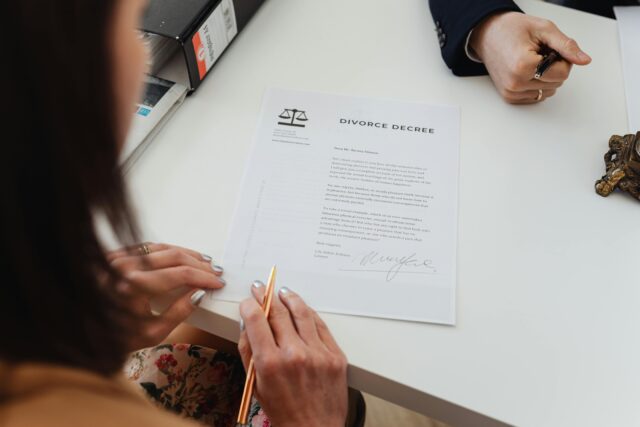How Can I Cancel My Divorce Petition in Massachusetts?
Middlesex County Probate Lawyer

When a loved one passes away, families are often left grieving while also facing legal responsibilities they may not feel prepared to handle. One of the first legal hurdles they may encounter is probate. Continue reading and reach out to a knowledgeable probate lawyer to learn about how the process works, what assets may be involved, and whether certain estate planning tools can help you avoid it altogether. Contact Mark Liam Gannon, Attorney at Law today.
What Is Probate in Massachusetts?
Probate is the legal process by which a deceased person’s estate is settled. In short, it involves identifying the deceased person’s assets, paying off debts and taxes, and distributing the remaining property to heirs or beneficiaries. If the person died with a will, the probate court will validate it and follow its instructions. If there is no will, the estate is distributed according to Massachusetts intestacy laws.
Many people assume probate is automatic or required in every case, but this isn’t always true. Probate is only necessary for certain types of property–typically, assets that were solely owned by the deceased person and do not have a designated beneficiary or joint owner. This means that assets like jointly owned real estate, life insurance policies with named beneficiaries, and accounts held in trust may not go through probate.
In Massachusetts, the probate process is overseen by the Probate and Family Court, with the Middlesex Division handling probate matters for families in communities such as Cambridge, Lowell, Newton, Framingham, and beyond.
What Estates Go Through Probate?
Not all estates in Massachusetts require probate. Whether an estate must go through probate depends largely on how the assets were owned at the time of death. Here are the types of assets that usually do require probate:
- Real estate titled solely in the decedent’s name
- Bank accounts held in the decedent’s name only, with no payable-on-death (POD) designation
- Personal property such as vehicles, jewelry, or art that is not jointly owned
- Business interests solely owned by the deceased
- On the other hand, the following assets typically avoid probate:
- Jointly owned property with rights of survivorship
- Assets with designated beneficiaries (e.g., IRAs, 401(k)s, life insurance policies)
- Assets placed in a properly funded revocable living trust
- Accounts with transfer-on-death or payable-on-death designations
In Massachusetts, smaller estates may qualify for a simplified version of probate called “voluntary administration.” This option is available if the total value of the probate estate is $25,000 or less (not including the value of a car) and the deceased person did not own any real estate. However, for larger estates or those involving real property, the full probate process will usually be necessary.
The Probate Process in Massachusetts
Probate can be time-consuming, and it involves several key steps. If you are named as the executor or personal representative in a will, or if you’re stepping into that role when there is no will, it’s essential to understand your duties. A brief overview of the process is as follows:
- Locate the Will and File a Petition: If a valid will exists, it must be filed with the Probate and Family Court along with a petition to begin probate. If no will exists, the court appoints a personal representative based on state law.
- Appointment of Personal Representative: Once the court accepts the petition, it issues “Letters of Authority,” which officially appoint the personal representative and give them the legal authority to act on behalf of the estate.
- Notify Heirs and Creditors: All interested parties, including heirs and known creditors, must be notified. A legal notice must also be published in a local newspaper to inform unknown creditors and the public.
- Inventory and Appraise Assets: The personal representative must identify and value all assets subject to probate. This may involve appraisals for real estate or other valuable property.
- Pay Debts and Taxes: The estate is responsible for paying off valid debts, funeral expenses, and applicable taxes, including Massachusetts estate tax if the estate exceeds certain thresholds.
- Distribute Remaining Assets: Once debts and taxes are settled, the remaining assets can be distributed to beneficiaries or heirs. This is done according to the will or, if no will exists, based on Massachusetts intestacy laws.
- Close the Estate: A final accounting is submitted to the court. Once approved, the estate is officially closed, and the personal representative is discharged from their duties.
Because this process is document-heavy and not always straightforward, it’s best to go through it with a knowledgeable probate lawyer in your corner.
Can a Trust Help Avoid Probate?
Yes. In many cases, setting up a revocable living trust is one of the most effective ways to avoid probate in Massachusetts. When assets are placed in a trust, they are no longer considered part of the individual’s probate estate. Instead, those assets are owned by the trust and can be transferred directly to beneficiaries according to the terms of the trust.
A properly drafted and funded trust can also offer other benefits, such as greater privacy (since probate is a public process), faster distribution of assets, and potential protection in the event of incapacity.
However, creating a trust is not a do-it-yourself task. The trust must be carefully drafted and, most importantly, funded, meaning the assets must be retitled into the name of the trust. Failing to fund the trust properly can leave assets exposed to probate, defeating the purpose of the plan.
Contact a Tyngsboro, Massachusetts Probate Lawyer
Whether you’re facing the probate process after the death of a loved one or planning your own estate to make things easier for your family in the future, you deserve experienced legal guidance. Contact a knowledgeable and dedicated probate lawyer here at Mark Liam Gannon, Attorney at Law for assistance today.
© 2026 Mark Liam Gannon, Attorney at Law.
All rights reserved. Attorney advertising.


